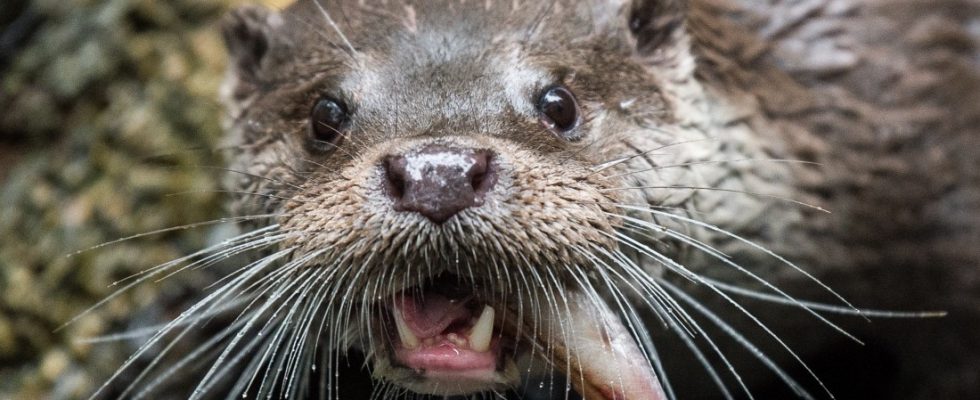When it comes to the otter, Franz Kühn has a clear opinion. “The damage it causes in my fish ponds is getting worse and worse,” says Kühn, who runs an extensive fish farm and the traditional Schwan inn in Tirschenreuth in the Upper Palatinate. “That’s why the new ordinance, with which the state government is now facilitating the shooting of otters, is correct.” At the Landesfischereiverband (LFV) they see things as bold. “We fishermen have been pointing out the growing problems with otters in Bavarian waters for years,” says Axel Bartelt, who has been president of the LFV for a few weeks and was president of the government of the Upper Palatinate until his retirement. “Now we finally have a secure legal basis for the much-needed regulation of otters.”
In the case of the nature conservation associations, especially the Bund Naturschutz (BN), they are appalled. Because otters – like wolves, whose shooting the state government has also made easier – are among the strictly protected animals that are protected all year round under European nature conservation law. They are also classified as endangered in the Red List of Germany. Lutra lutra, as it is called scientifically, was native to Bavaria for centuries. Like other predators, the animals were hunted mercilessly. Because otters are not only extremely skilled swimmers. Instead, they eat up to 1.2 kilos of fish a day. 30 years ago they were exterminated except for a few specimens in the Bavarian Forest.
In the meantime, the stocks have increased significantly again. Especially in the Upper Palatinate and Lower Bavaria. According to a report by the State Institute for Agriculture (LfL), around 650 otters live in the two administrative districts. The Oberpfälzer Teichwirt Kühn puts the damage caused by them alone in his business at around 15,000 euros a year – “with an upward trend”, as he emphasizes. Agriculture Minister Michaela Kaniber (CSU), who is also responsible for fish farming, speaks of a total of 2.7 million euros in damage in the Upper Palatinate and Lower Bavaria in 2022. As far as the population in the rest of Bavaria is concerned, the LfL did not want to commit itself. The data from there are so incomplete that an assessment based on them would immediately meet with criticism. Therefore, additional data should be collected. An estimate of the total population is expected by the end of 2023.
The Administrative Court will hear the case on Monday
On Monday, the Bavarian Administrative Court (VGH) deals with the otter. To be precise, with a pilot project by the government of the Upper Palatinate under its then President Bartelt. According to this, up to six male otters should be allowed to be caught and killed in three fish farms there in order to prevent further damage caused by feeding on them. The reason for this is a ruling by the administrative court (VG) Regensburg against the project. In their verdict, the Regensburg judges fully confirmed the strict protection status of the otter. They also share the assessment of the BN and other experts that catching and killing the animals is unsuitable for preventing damage to the fish industry. Because areas that become free are quickly reoccupied by following otters. In addition, it cannot be ruled out that females and young animals will fall into the traps, which is prohibited, the judges ruled. The Free State did not accept the verdict and appealed against it.
With the new otter ordinance of the state government, the controversial pilot project is actually obsolete. Because the regulation goes far beyond it. According to her, since May 1st, otters can be taken all year round wherever they cause “serious damage to fisheries”. However, removal is only permitted if there are no reasonable alternatives, such as fencing off the fish ponds. In addition, the preservation of the population must not be deteriorated. Therefore, a maximum number of animals that may be shot should be set in the respective regions. The VGH is therefore primarily concerned with whether the plaintiff and the defendant can still have an interest in continuing the dispute over the project or whether it is unnecessary because of the new regulation.
Agriculture Minister Michaela Kaniber estimates the damage caused by otters in the past year at 2.7 million euros.
(Photo: Catherine Hess)
At the BN, they very much hope that the VGH will decide on the pilot project. Because they see many parallels between him and the regulation. Should the VGH also declare the pilot project null and void, that would be a precedent against the new regulation from the point of view of the BN species protection expert Christine Margraf. But not only the BN has a problem with the regulation. Even pond keepers like Kühn are not really sure that it will last. And not just in legal terms. But also in practice. “It starts with finding hunters who are willing to spend the night at our fish ponds and hunt the animals,” says Kühn. “It would also be very complicated if we had to submit a separate application for each otter to be shot.”

